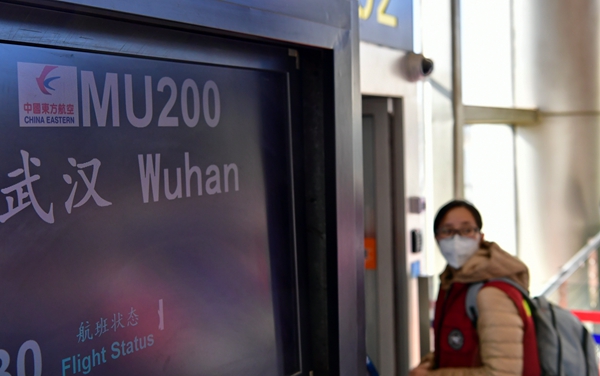
A medical team member prepares to board the flight to Hubei at Taiyuan Wusu Airport in north China's Shanxi province, Feb. 15, 2020. [Photo/Xinhua]
The American entry ban on foreigners who have recently spent time in China has already prevented many students, researchers, businesspeople and travelers with legal visas from entering the United States. Yet this is unnecessary – maybe even counterproductive – according to experts on public health and epidemiology.
A few other countries, most notably Australia, followed the U.S. example, but the majority of countries have not. High-income countries neighboring China, Japan and South Korea, allow people to enter from China, just not those who have recently spent time in Hubei province. Canada's leaders pointedly said they were "following the recommendation of the World Health Organization" – that is, not implementing a travel ban.
The reason the WHO recommends against travel bans is because they are ineffective. They impose costs on the target country and the banning country without creating many, if any, benefits. Even American border and customs professionals do not support broad travel bans.
John Wagner, one of the leaders of field operations during the Ebola outbreak in 2014, testified when the U.S. was considering a travel ban on countries affected by the Ebola virus, saying, "It is easier to manage and control [the virus] when we know where people are coming from voluntarily and not trying to deceive us."
A paper on the effectiveness of the 2003 response to SARS by Ho-fung Hung, a professor at Johns Hopkins University, concluded that it was "counterproductive" to try to "curb the transborder flow of travelers."
The United States and Australia, which are among the world's most developed countries, are fully capable of dealing with the risks of COVID-19 without resorting to extreme measures. Their decisions can be much more easily explained by domestic politics and nationalism.
The United States has always had a kind of contradictory view of itself. On the one hand, it sees itself as the world's leading superpower. On the other hand, being separated from Europe and Asia by oceans on either side, it sees itself as an "exceptional" country – different and superior to the rest of the world.
President Donald Trump has proposed the "America First" slogan. Although even Trump's attitude is contradictory, while arguing for withdrawing from the world, he still wants the U.S. to be the unchallenged global superpower and impose his will on those, like Iran, that do not fall in line.
It may not be a coincidence that Trump's China travel ban came at the same time he has expanded his original anti-Muslim travel ban. When running for president, Trump called for "a complete shutdown of Muslims entering the United States." After the ban was challenged in court, it had to be altered a few times to simply include a random list of Asian and African countries with large Muslim and non-white populations, in order to allow it to pass legal scrutiny.
Jumping to simplistic answers for complicated issues is never a reasonable way to solve problems. In this particular case, the "problem" is the animosity towards people of different races coming from different countries.
Banning visitors from China could well hurt the economies of the United States, Australia, and other countries that have taken such measures. This is not least because of the fact that it will make it harder for businesspeople to meet.
Oxford Economics – a global forecasting and quantitative analysis company – estimates that the number of Chinese tourists to the United States, who spent about 40% more than the average tourist, will decline by 1.6 million. And, while a decline is also expected to occur in other countries, the travel ban may well harm the reputation of the U.S., making it less likely for tourists to visit even after the ban is lifted. Worryingly, it could also harm the scientific community by making it harder for scholars to collaborate and share knowledge.
Mitchell Blatt is a columnist with China.org.cn. For more information please visit:
http://www.ccgp-fushun.com/opinion/MitchellBlatt.htm
Opinion articles reflect the views of their authors, not necessarily those of China.org.cn.
If you would like to contribute, please contact us at opinion@china.org.cn.




